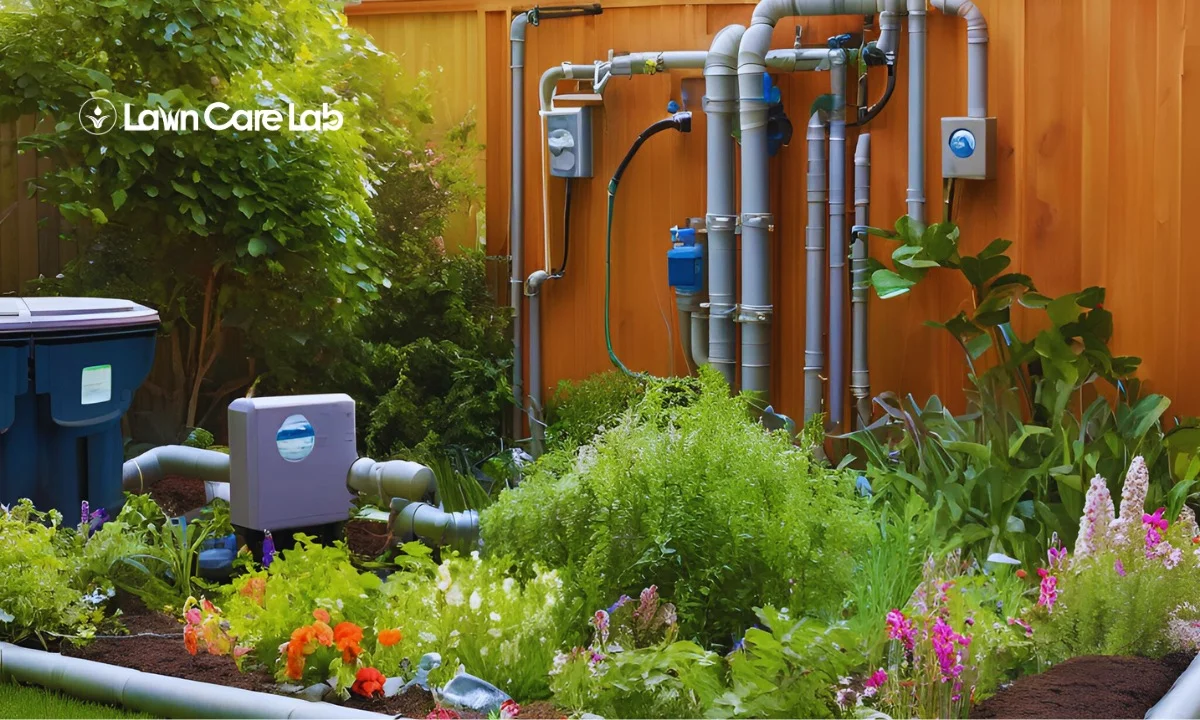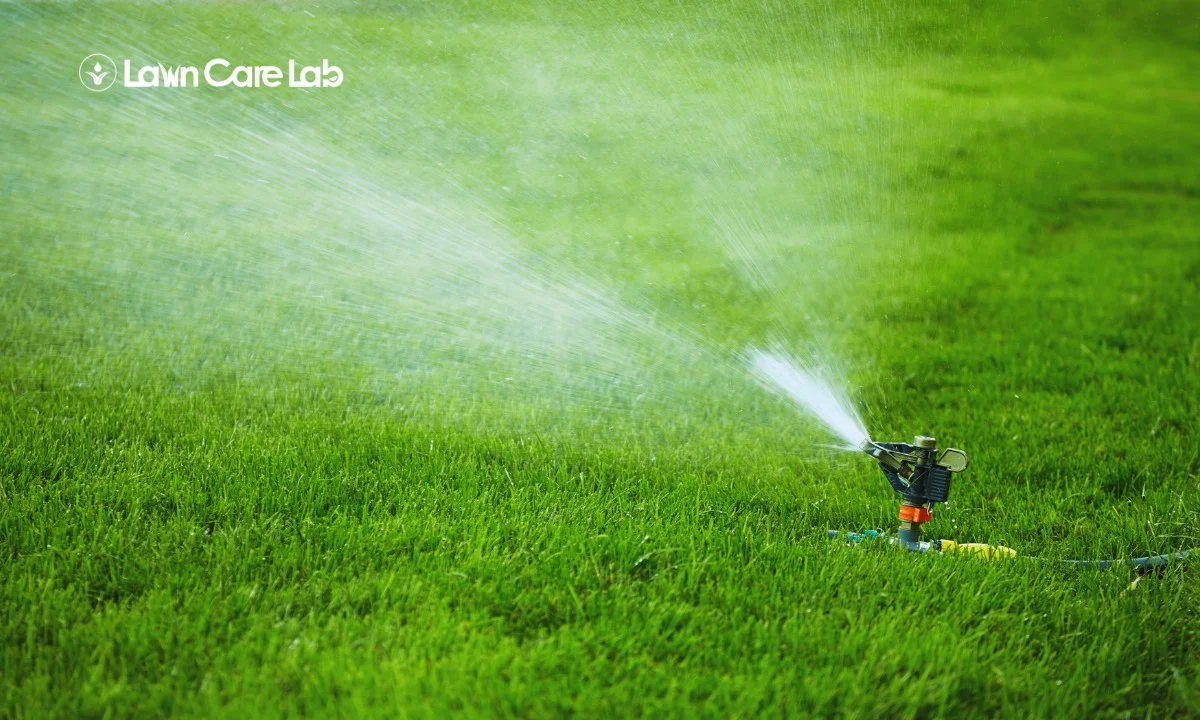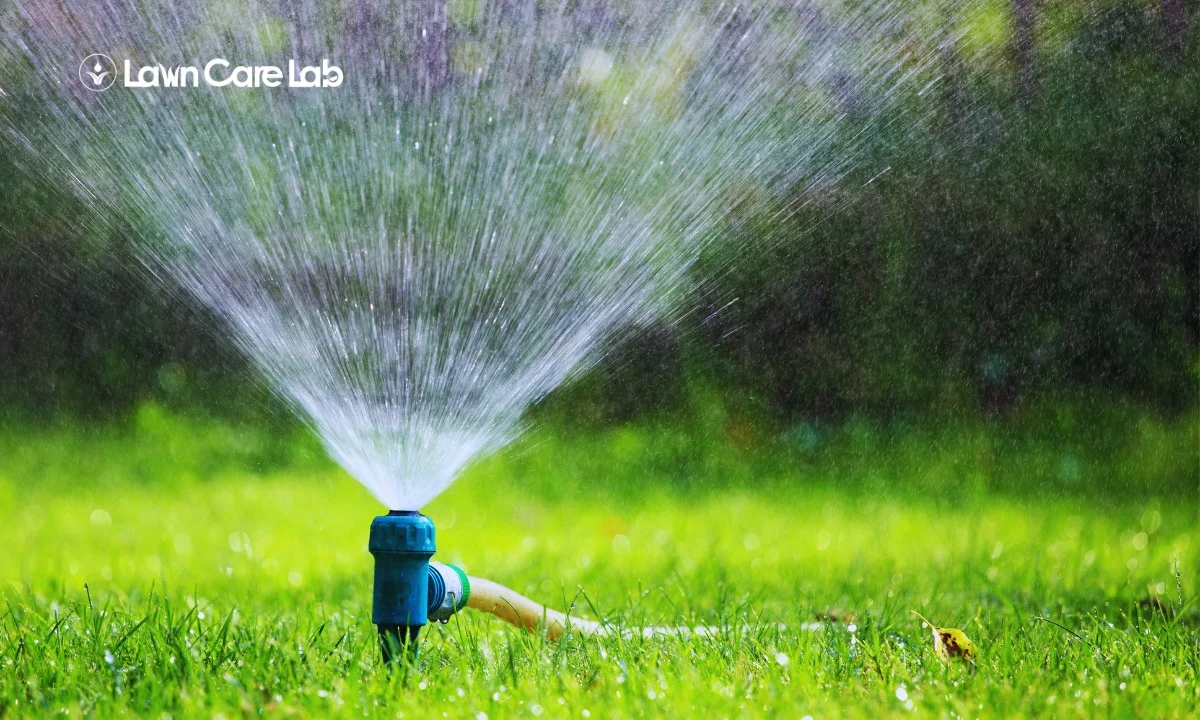As you think about reducing your water bill, consider using greywater systems to water your lawn. These systems reuse water from your home, making them a green choice.
First, pick soaps and detergents that are safe for the environment. This is crucial because harsh chemicals can damage your plants.
Next, install a filter to clean the water before it goes onto your lawn. This step helps remove any debris and impurities, ensuring your grass gets clean water.
It’s also important to keep your system working well all year round.
We’ll show you how to maintain your system effectively. By following this greywater for lawn irrigation tips, your lawn will stay healthy and green.
Table of Contents
Understanding Greywater and Its Benefits
Greywater is water from sinks, showers, and appliances, excluding toilets. It’s ideal for watering lawns and helping conserve fresh water.
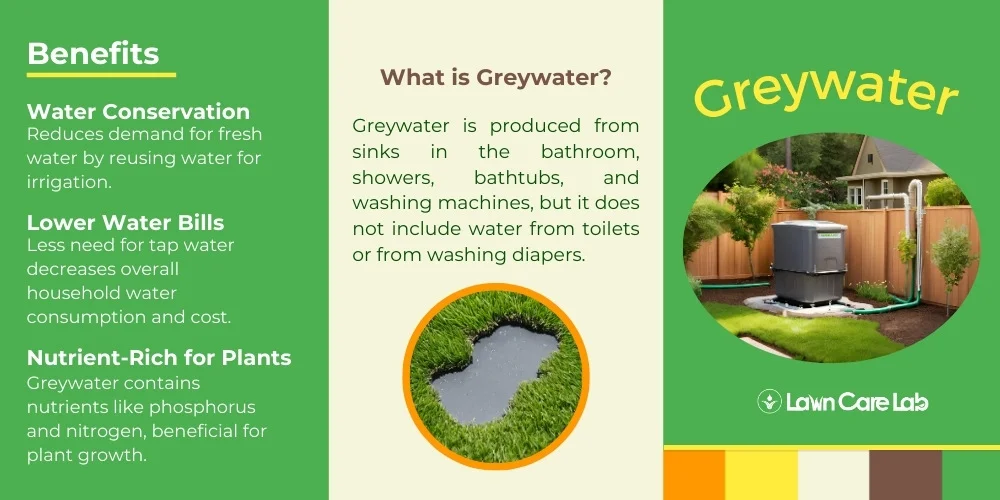
Using a greywater system conserves water, reduces pressure on sewer systems, and prevents overflows. A system like the Aqua2use Greywater Filter, for instance, treats water from showers and laundry, making it safe for garden use.
What is Greywater?
Greywater is produced from sinks in the bathroom, showers, bathtubs, and washing machines, but it does not include water from toilets or from washing diapers.
Although it might look unclean, treated greywater can be used safely to water your garden.
Sources of Greywater:
- Bathroom Sink: Contains dirt, grease, and hair; avoid using this water if it contains strong chemicals.
- Shower: May have leftover soap and skin particles. Do not use if it was used to wash diapers.
- Washing Machine: Can contain lint, detergent, and hair. Avoid using if it may be contaminated with fecal matter.
Using greywater correctly helps to conserve drinking water and enhances your garden by reusing water that would otherwise go to waste.
Advantages of Using Greywater for Lawn Irrigation
Using greywater on your lawn offers numerous benefits:
- Reduces fresh water usage and cuts down water bills.
- Contains nutrients like phosphorus and nitrogen that promote plant growth.
- Eases pressure on sewage systems, making it an eco-friendly choice.
Greywater is a sustainable, cost-effective way to keep your lawn healthy and vibrant.
Assessing Your Lawn’s Requirements
To use greywater effectively for watering your lawn, start by checking your soil type. Knowing if your soil is clay, loam, or sandy helps manage water better.
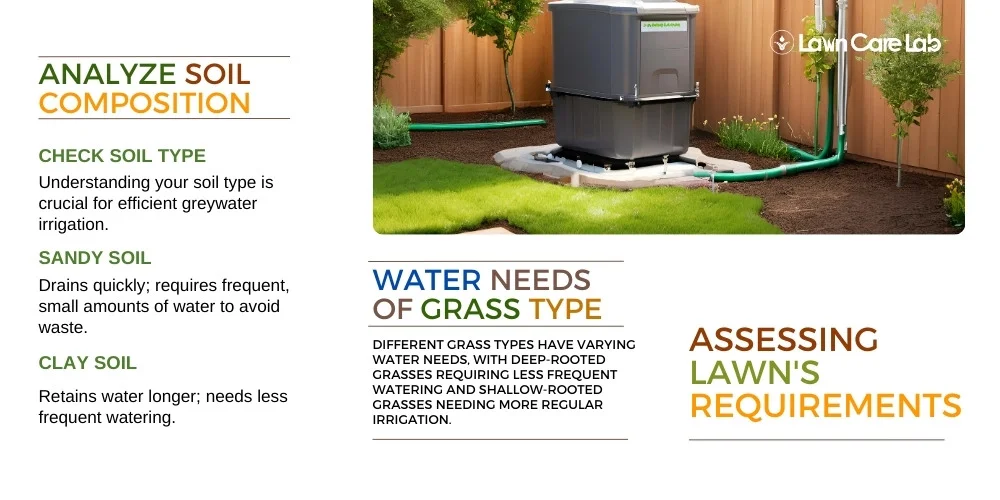
Also, find out how much water your type of grass needs to avoid over or under-watering. This way, you use just the right amount of greywater, saving water and keeping your lawn healthy.
Analyzing Soil Composition
To effectively use greywater for watering your lawn, it’s important to first check what type of soil you have. This helps you decide the best way to irrigate your lawn.
For example, sandy soil drains fast and needs water more often but in small amounts to avoid water waste. On the other hand, clay soil retains water longer, so it doesn’t need watering as often.
Knowing your soil type allows you to set up a greywater system that saves water and meets your lawn’s specific needs, helping it grow well and sustainably.
Determining Water Needs Based on Grass Type
Understanding the water requirements of your grass type is crucial.
- Deep-rooted grasses like buffalo and Bermuda are drought-resistant and need less frequent watering.
- Shallow-rooted grasses require more regular irrigation.
Regularly check soil moisture and adjust watering based on seasonal and weather changes. A moisture meter can help ensure precise irrigation, avoiding over-watering and waste.
Setting Up a Greywater Irrigation System
To set up a greywater irrigation system, gather items like filters, pumps, and distribution pipes. Decide whether to install it yourself or hire a professional based on your technical skills and system complexity.
If unsure, hiring a professional ensures proper setup and compliance with local regulations.
For DIY, use a simple pump like the EcoPlus Submersible Pump and a basic filter from GreyWater Systems Inc.
Be sure to check local laws. A well-planned system can save water and reduce bills, making it a valuable investment.
Essential Components of a Greywater System
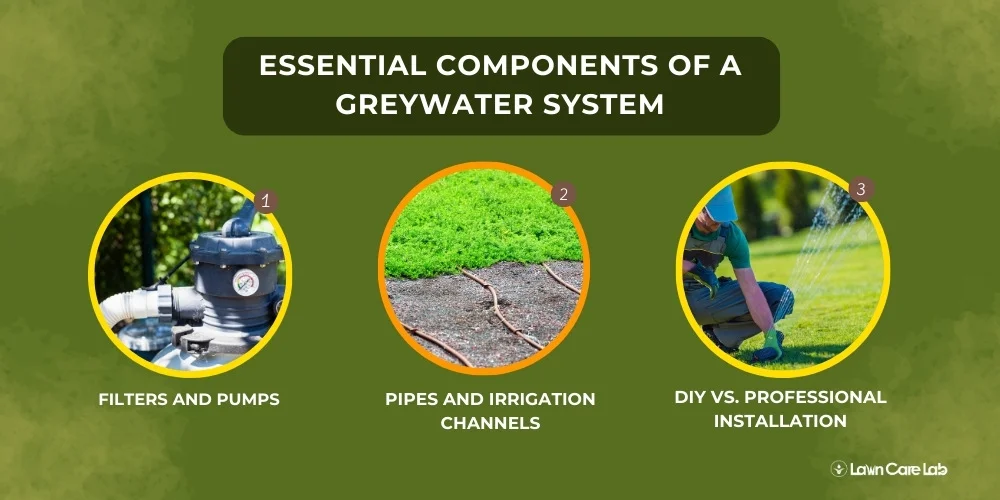
To set up an effective greywater irrigation system, you’ll need filters, pumps, and pipes to distribute the water throughout your garden. Drip irrigation hoses are a practical option for consistent water distribution while conserving resources.
Filters and Pumps
- Filters are essential to prevent blockages, so clean them regularly to keep your system running smoothly.
- Pumps help distribute water evenly when gravity isn’t enough.
- Submersible pumps are a quieter option since they operate underwater.
- Make sure the pump you choose is powerful enough for your lawn size, and ensure safe electrical installation.
Pipes and Irrigation Channels
- Customize your pipe layout to water your lawn evenly without waste.
- Use sturdy, non-toxic pipes like PVC to avoid contamination and ensure durability.
- Design the system with easy access for cleaning and maintenance.
DIY vs. Professional Installation
- Be aware of local regulations before starting.
- Simple systems might be suitable for DIY, but more complex setups usually require a professional.
- While professional installation might seem expensive, it can save you from costly DIY mistakes.
- A professional ensures the system is installed correctly and safely, reducing the risk of future issues.
If you’re uncertain about your technical abilities, opting for professional installation will likely result in a more reliable and long-lasting system.
Safe Use Practices for Greywater Irrigation
To use greywater effectively for watering your lawn, it’s important to ensure the water is clean and safe. Start by removing any harmful substances that could damage your plants or soil.
Make sure to regularly check and clean your greywater system to avoid blockages and to keep the water flowing smoothly.
Why is this important? Using untreated or poorly maintained greywater can harm your garden and the environment. For example, filters like the “Aqua2use Greywater Filter System” can help in keeping the water clean by trapping debris and contaminants.
Remember, regular upkeep of your system extends its life and ensures that your lawn gets the right amount of water.
Ensuring Suitable Greywater Quality
To keep greywater safe for irrigation, avoid harsh chemicals like bleach and fabric softeners that harm soil and plants.
Opt for biodegradable, non-toxic products, such as eco-friendly detergents labeled safe for greywater systems, to protect both your plants and soil.
What to Exclude from Greywater
When using greywater to water your lawn, it’s essential to keep it free from certain harmful substances to protect the health of your soil and plants.
Here’s what you should avoid:
- Non-biodegradable chemicals: These substances don’t break down easily in the environment and can harm soil and plant life. For example, avoid using cleaning products with labels that warn against environmental hazards.
- Harsh detergents: Strong cleaning agents can damage plants and degrade soil quality. Opt for eco-friendly or plant-based detergents when possible.
- Water contaminated with fecal matter: This type of water can introduce harmful bacteria and pathogens into your garden, posing health risks. Always use clean, uncontaminated water for irrigation.
- Water from washing diapers: Similar to the above, this water can contain bacteria and harmful waste. It should never be used for gardening or lawn care.
Steering clear of these contaminants ensures that your lawn remains healthy and vibrant.
Always choose products wisely and read labels to make sure they’re safe for use with greywater systems.
Maintaining Your Greywater System
Regular maintenance is key to keeping your greywater system efficient.
Monthly, clean filters, inspect pipes and ensure the pump is functioning. This helps identify issues early, preventing costly repairs. For example, use a brush to clear debris from filters and keep a spare filter available.
Routine Checks and Balances
Ensuring your greywater system remains in top condition involves simple, regular checks to prevent leaks, blockages, and equipment failure.
Here’s a straightforward guide to help you maintain it:
- Monthly Inspection of Hoses and Pipes: Inspect hoses and pipes monthly. Dripping or wet spots indicate leaks. Catching these early prevents bigger issues.
- Check Filters and Pumps: Make it a routine to examine your system’s filters and pumps. Look for any blockages or signs of wear that might affect performance. Clearing blockages and replacing worn parts keeps your system running smoothly.
- Tighten Joints and Connections: Connections in your system should be snug and secure. Check these regularly to ensure there are no loose parts that could lead to leaks.
- Test Soil and Water Quality: Periodically, It’s important to test the quality of the soil and water affected by your greywater to ensure they meet safety standards and keep your garden healthy.
Legal Considerations and Compliance
Before installing a greywater system, ensure you understand local regulations.
Obtain required permits, schedule inspections, and follow guidelines for system types, installation standards, and allowed uses.
Health and safety rules may also apply to protect the environment.
Steps for Compliance:
- Contact local authorities.
- Obtain necessary permits.
- Submit paperwork.
- Arrange inspections.
- Follow any recommendations.
This ensures your system operates legally and safely, contributing to efficient water management.
Maximizing the Benefits of Greywater Irrigation
To maximize greywater benefits, plan the timing and frequency of watering based on your lawn’s needs. Regularly monitor its condition to prevent overwatering or nutrient loss.
Use a moisture meter for accurate watering and an adjustable sprinkler system for even, efficient distribution, promoting a healthy lawn while conserving water.
Timing and Frequency of Irrigation
When setting up an irrigation schedule for your lawn using greywater, it’s important to consider how well the soil can absorb water and how much moisture your grass needs.
Here are some straightforward steps to help you manage your watering effectively:
- Check Your Soil Type: Since sandy soil drains quickly, you might need to water more frequently than you’d with clay soil, which holds moisture longer.
- Watch the Weather: Water more in the hot, dry months and cut back when it’s cooler and rainier.
- Look at Your Lawn: If you see puddles, you’re watering too much. If the grass starts to turn brown, it needs more water.
- Set the Right Flow: Make sure the greywater spreads out evenly and doesn’t soak in faster than the ground can absorb it. This helps prevent water waste and protects the nutrients in the soil.
Monitoring Lawn Health and Adjustments
To keep your lawn healthy when using greywater for irrigation, it’s crucial to regularly check its condition and tweak your watering schedule and system settings as needed.
If you notice your grass wilting or turning yellow, it’s a sign that your lawn needs more water. On the other hand, soggy soil means you’re overdoing it.
Ensure the water spreads evenly across your lawn to avoid uneven growth and waste.
Every so often, look closely at how your grass is growing and respond by adjusting how much greywater you use.
This careful monitoring keeps your lawn looking great and helps you use water more efficiently and safely.
Conclusion
Using greywater for lawn irrigation is an eco-friendly and cost-effective way to conserve water while maintaining a healthy lawn.
To ensure safe and effective use, choose biodegradable, non-toxic cleaning products, filter greywater, and avoid contaminants like harsh chemicals or fecal matter.
Regularly maintain your greywater system by cleaning filters, checking pipes, and adjusting watering based on soil type and grass needs.
With proper setup, regular maintenance, and adherence to local regulations, greywater systems can significantly reduce water waste and support sustainable gardening practices.
Frequently Asked Questions
Can Greywater Be Used to Water Vegetable Gardens?
How Does Greywater Affect Soil Ph Over Time?
Are There Filtration Systems Specifically for Greywater?
How Often Should Greywater Systems Be Maintained?
Can I Use Greywater During Drought Restrictions?
- How to Create a Lawn Care Schedule for Southern Climates - October 30, 2024
- How to Use Compost Tea to Boost Lawn Growth and Soil Health - October 23, 2024
- The Best Grasses for Saltwater-Exposed Lawns: Coastal Lawn Care - October 17, 2024

